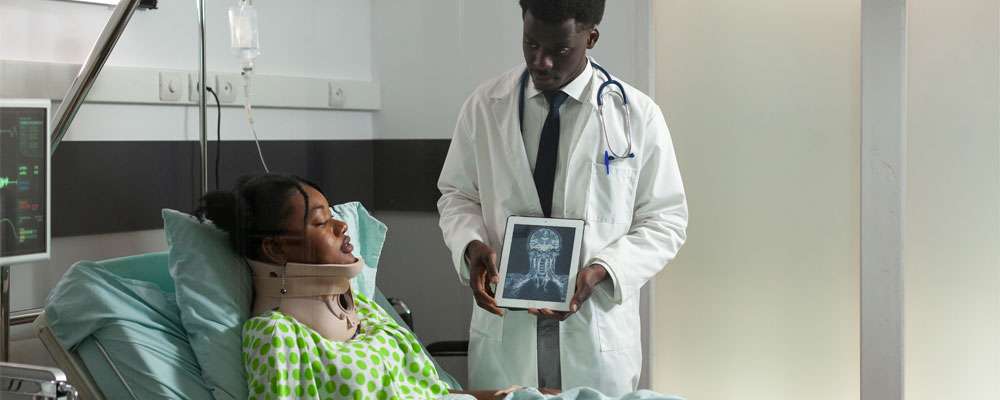You already know how serious whiplash can be if you have ever experienced it in a Whiplash Car Accident. Many people don’t get treatment for whiplash injury or don’t even know they have it until their back, neck, or head pain worsens.
Knowing what to do for whiplash after a car accident is crucial because, by that point, you might have already experienced complications or worsened the injury.
Symptoms of Whiplash After Car Accident
Most road traffic accidents are linked to whiplash. However, it is possible to experience a whiplash injury resulting from any accident that suddenly sends the head or body jolting. Contact sports injuries, assaults, trips, slip-and-fall accidents, and amusement rides can bring on whiplash.
Symptoms of Whiplash after car accident typically appear 6 to 12 hours after an accident, with further bruising and inflammation taking 24 to 48 hours to manifest. The primary signs and symptoms of a whiplash include:
- Neck stiffness
- Upper and lower back pain
- Shoulder and arm discomfort
- Headaches
- Numbness or tingling
- Inflation and swelling
- Weirdness and exhaustion
- Nausea and irritability
The symptoms mentioned above may also develop into chronic issues like sleep issues, concentration and memory issues, insomnia, hypochondriasis, etc., if not treated right away.
Treatment for Whiplash After Car Accident
The first thing you should do is treat your whiplash as a serious medical condition that requires medical attention. People who undergo a whiplash injury are likely to experience little to no pain following the collision, despite having serious wounds. This is due to the following factors:
Our body releases cortisol and adrenaline shortly after the car accident, two hormones that help you cope with pain and react quickly in an emergency. But as these hormones wear off, the pain may intensify significantly.
You might experience swelling in the injured areas the first day and night after the injury. Your body produces this swelling as a protective measure, but it also puts pressure on wounds and aggravates stiffness and pain.
Delicate soft tissue, such as muscles and ligaments, is often injured in whiplash car accidents. Daily activity will continue to irritate the injury if it is not treated immediately and could even worsen it. Over weeks, a minor muscle injury can worsen and become incapacitating.
This is why getting medical attention is the best action following whiplash or neck pain after a car accident. Even if you are experiencing neck, back, head, or jaw pain due to some other reasons, you should visit your general practitioner right away and get it resolved.
Recovering from Whiplash after Accident
The NHS states that whiplash from car accidents typically lasts two to three months. Due to the wide range in injury severity, recovery times can exceed three months, and in the worst scenarios, symptoms can last longer than a year.
Minor Car Accident
A few days of upper back and neck pain after car accident are possible if you have whiplash from a minor car accident. Typically, you can treat this by taking a pain reliever like ibuprofen or paracetamol. Other handy whiplash treatments include using an ice pack on the stiff areas and cervical collars.
Typically, symptoms of whiplash ease up in 2–3 weeks. However, it is highly advised to keep your head and neck mobile to give you the best chance of healing. You can also speed up your healing process by using the support of a neck brace or cervical collar.
Chronic Car Accident
Chronic whiplash is the name for symptoms that persist for at least six months. It happens mostly due to delayed neck pain after car accident. Chronic whiplash patients are more likely to have been in more severe accidents that resulted in more severe head, neck, and upper body injuries.
For faster recovery, physiotherapy and orthopaedic care may be required, in addition to stronger painkillers that your doctor may prescribe. The possibility of your mental health being negatively impacted by the suffering and discomfort brought on by the long-term effects is also high.
Therefore, you might also need psychological assistance to help you manage your pain and lifestyle changes. In some cases, the symptoms of whiplash after car accident might never completely disappear. There may be a need for long-term physical therapy or rehabilitation.
Get the Right Help Now
Seek medical help as soon as possible for the best chance at hastening your recovery. Injuries can be accurately diagnosed by your doctor, who can also recommend a treatment strategy to hasten your recovery.
Don’t wait any longer to get the assistance you need, regardless of whether you were recently hurt or are still dealing with the long-term effects of a whiplash car accident.
You deserve to live a pain-free life. Just make sure you get the right kind of assistance. Get in touch with us to learn about how concise medico team of medical experts can assist you in recovering from a whiplash injury and regaining your quality of life.
You already know how serious whiplash can be if you have ever experienced it in a Whiplash Car Accident. Many people don’t get treatment for whiplash injury or don’t even know they have it until their back, neck, or head pain worsens.
Knowing what to do for whiplash after a car accident is crucial because, by that point, you might have already experienced complications or worsened the injury.
Symptoms of Whiplash After Car Accident
Most road traffic accidents are linked to whiplash. However, it is possible to experience a whiplash injury resulting from any accident that suddenly sends the head or body jolting. Contact sports injuries, assaults, trips, slip-and-fall accidents, and amusement rides can bring on whiplash.
Symptoms of Whiplash after car accident typically appear 6 to 12 hours after an accident, with further bruising and inflammation taking 24 to 48 hours to manifest. The primary signs and symptoms of a whiplash include:
- Neck stiffness
- Upper and lower back pain
- Shoulder and arm discomfort
- Headaches
- Numbness or tingling
- Inflation and swelling
- Weirdness and exhaustion
- Nausea and irritability
The symptoms mentioned above may also develop into chronic issues like sleep issues, concentration and memory issues, insomnia, hypochondriasis, etc., if not treated right away.
Treatment for Whiplash After Car Accident
The first thing you should do is treat your whiplash as a serious medical condition that requires medical attention. People who undergo a whiplash injury are likely to experience little to no pain following the collision, despite having serious wounds. This is due to the following factors:
Our body releases cortisol and adrenaline shortly after the car accident, two hormones that help you cope with pain and react quickly in an emergency. But as these hormones wear off, the pain may intensify significantly.
You might experience swelling in the injured areas the first day and night after the injury. Your body produces this swelling as a protective measure, but it also puts pressure on wounds and aggravates stiffness and pain.
Delicate soft tissue, such as muscles and ligaments, is often injured in whiplash car accidents. Daily activity will continue to irritate the injury if it is not treated immediately and could even worsen it. Over weeks, a minor muscle injury can worsen and become incapacitating.
This is why getting medical attention is the best action following whiplash or neck pain after a car accident. Even if you are experiencing neck, back, head, or jaw pain due to some other reasons, you should visit your general practitioner right away and get it resolved.
Recovering from Whiplash after Accident
The NHS states that whiplash from car accidents typically lasts two to three months. Due to the wide range in injury severity, recovery times can exceed three months, and in the worst scenarios, symptoms can last longer than a year.
Minor Car Accident
A few days of upper back and neck pain after car accident are possible if you have whiplash from a minor car accident. Typically, you can treat this by taking a pain reliever like ibuprofen or paracetamol. Other handy whiplash treatments include using an ice pack on the stiff areas and cervical collars.
Typically, symptoms of whiplash ease up in 2–3 weeks. However, it is highly advised to keep your head and neck mobile to give you the best chance of healing. You can also speed up your healing process by using the support of a neck brace or cervical collar.
Chronic Car Accident
Chronic whiplash is the name for symptoms that persist for at least six months. It happens mostly due to delayed neck pain after car accident. Chronic whiplash patients are more likely to have been in more severe accidents that resulted in more severe head, neck, and upper body injuries.
For faster recovery, physiotherapy and orthopaedic care may be required, in addition to stronger painkillers that your doctor may prescribe. The possibility of your mental health being negatively impacted by the suffering and discomfort brought on by the long-term effects is also high.
Therefore, you might also need psychological assistance to help you manage your pain and lifestyle changes. In some cases, the symptoms of whiplash after car accident might never completely disappear. There may be a need for long-term physical therapy or rehabilitation.
Get the Right Help Now
Seek medical help as soon as possible for the best chance at hastening your recovery. Injuries can be accurately diagnosed by your doctor, who can also recommend a treatment strategy to hasten your recovery.
Don’t wait any longer to get the assistance you need, regardless of whether you were recently hurt or are still dealing with the long-term effects of a whiplash car accident.
You deserve to live a pain-free life. Just make sure you get the right kind of assistance. Get in touch with us to learn about how concise medico team of medical experts can assist you in recovering from a whiplash injury and regaining your quality of life.






